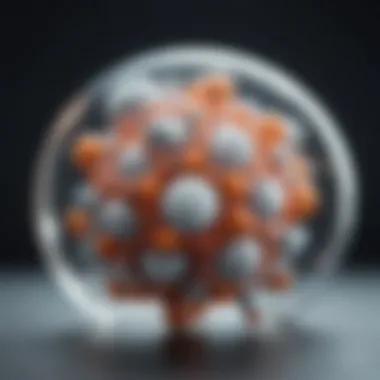Novel Antidepressants: Insights and Trends from 2021


Overview of Research Topic
Brief Background and Context
The realm of antidepressants has undergone significant transformations in recent years. Traditional treatments have come under scrutiny due to their varied efficacy and side effects. In 2021, novel antidepressants emerged as potential game changers in the treatment of depression. These newer compounds promise different mechanisms of action that may better target the underlying neurobiological processes associated with mood disorders. The exploration of these medications is timely, as mental health has been prioritized in public health discussions, especially in the wake of global challenges such as the COVID-19 pandemic.
Importance in Current Scientific Landscape
The importance of investigating emerging antidepressants cannot be overstated. Current antidepressants often require weeks before effects are felt and can lead to undesirable side effects. The recent wave of innovative drugs aims to address these shortcomings. Some of these medications show promise in rapidly alleviating symptoms while also minimizing adverse effects. By examining their mechanisms of action and their potential for personalized treatment strategies, researchers and practitioners can work towards improving patient outcomes and addressing gaps in existing treatment paradigms.
"Personalizing antidepressant therapies based on individual patient characteristics could significantly enhance treatment efficacy and safety."
Methodology
Research Design and Approach
This overview employs a comprehensive literature review to synthesize current knowledge about emerging antidepressants from 2021. The focus is on identifying key innovations in drug design, mechanisms of action, and clinical trial outcomes. By analyzing peer-reviewed articles, clinical trial registries, and current literature, this examination provides a robust understanding of the recent advancements in antidepressant pharmacotherapy.
Data Collection Techniques
Data collection for this review is performed through various techniques:
- Literature Databases: Utilizing platforms like PubMed and Google Scholar to access the latest studies on novel antidepressants.
- Clinical Trials: Examining recent clinical trials related to new antidepressant development to gather results on efficacy and safety outcomes.
- Expert Opinions: Integrating insights from specialists in psychiatry and pharmacology to understand the clinical implications of new medications.
The narrative unfolds through meticulous attention to the data collected, ensuring a thorough analysis of the evolving landscape in antidepressant treatments.
Intro to Antidepressants
Antidepressants play a crucial role in the management of depressive disorders, which affect millions of individuals worldwide. Understanding the evolution and current context of these medications is vital. This article delves into the dynamics of novel antidepressant developments in 2021.
Historical Context
The journey of antidepressants began in the 1950s with the introduction of tricyclic antidepressants and monoamine oxidase inhibitors. These early treatments offered hope, but they were burdened by numerous side effects. Over time, selective serotonin reuptake inhibitors, such as fluoxetine, emerged. These offered a more favorable side effect profile, leading to widespread use. Despite their success, many patients still struggled to achieve full remission, necessitating ongoing research into more effective options.
As the understanding of depression deepened, newer modalities began to take shape. The late 20th and early 21st centuries saw a shift towards targeting neurotransmitter systems such as serotonin, norepinephrine, and dopamine more precisely. Innovation continued with the advent of atypical antidepressants, which provided alternatives for those who did not respond to traditional treatments. However, the field has remained relatively stagnant, sparking interest in alternative treatments and encouraging exploration of novel therapeutic pathways in recent years.
Current Treatment Landscape
Today, the treatment landscape for depression is diverse yet complex. The standard antidepressants include SSRIs like sertraline and escitalopram, along with serotonin-norepinephrine reuptake inhibitors, which are prescribed frequently. These medications effectively relieve symptoms for many, but they are not universally effective. Approximately one-third of patients do not respond adequately.
The search for solutions continues, leading to interest in treatments such as ketamine and psychedelic-assisted therapies. These novel approaches are gaining traction in clinical settings, prompting discussions around their incorporation into mainstream psychiatry. It highlights an important shift towards an integrative approach to mental health, which may combine established therapies with these newer, unorthodox treatment modalities.
"The landscape of antidepressants is not static. Ongoing research is essential to address the unmet needs in depression treatment."
In summary, the historical context shapes the current treatment landscape, which is characterized by innovation and a longer-term view of mental health therapies. With a growing emphasis on personalized treatment strategies, understanding these elements is critical for anyone involved in research, clinical practice, or education in mental health.
Mechanisms of Action
Understanding the mechanisms of action for novel antidepressants is crucial for comprehending how these medications treat depression effectively. The intricate pathways involved dictate the excitability of neurons, the release of neurotransmitters, and the overall mood regulation. Grasping these mechanisms can lead to enhanced treatment strategies and improve patient responses to therapy. Additionally, it brings awareness to the potential for personalized treatments tailored to individual biological profiles.
Understanding Neurotransmitter Systems
Neurotransmitters are key players in mood regulation. They carry signals across synapses between neurons. The major neurotransmitters include serotonin, norepinephrine, and dopamine. Each of these affects mood, cognition, and emotional response. Abnormalities in these neurotransmitter systems often correlate with depressive symptoms. For instance, serotonin is primarily associated with mood stabilization. Norepinephrine impacts arousal and alertness, while dopamine is linked with pleasure and reward.
Novel Targets for Antidepressant Treatment
As science progresses, researchers are identifying novel targets beyond traditional neurotransmitter systems for antidepressant medications. These targets include:


Glutamatergic System
The glutamatergic system has gained attention due to its role in synaptic plasticity and neuronal communication. Glutamate is the main excitatory neurotransmitter. It also influences the mechanisms of learning and memory. Enhancing glutamatergic transmission can provide rapid relief from depressive symptoms, compared to conventional treatments that can take weeks to show effects. The unique characteristic of targeting glutamate receptors, such as NMDA, is that it can offer a quicker onset of action. However, there can be a fine line, as overstimulation might lead to neuronal toxicity.
Nerve Growth Factor
Nerve Growth Factor (NGF) is vital for the survival and maintenance of neurons. Its role in neuroplasticity has prompted researchers to explore its potential in treating depression. The excitement around NGF arises from its ability to promote neurogenesis, which is the creation of new neurons. This characteristic provides hope for long-term recovery from depressive states. Yet, the challenge lies in accurately regulating NGF levels, as unregulated or excessive NGF can lead to unwanted effects, complicating treatment.
Inflammatory Mediators
Recent findings indicate the significant involvement of inflammatory mediators in depression. Markers of inflammation are found at elevated levels in many depressed individuals. Targeting these mediators could modulate the immune response, offering a new avenue for treatment. The key characteristic is that addressing inflammation might reduce some core symptoms of depression. However, researchers need to ensure that targeting inflammation doesn’t disrupt the necessary immune functions of the body, which adds complexity to treatment strategies.
Overview of Novel Antidepressants in
The landscape of antidepressant research and development in 2021 reveals significant shifts towards innovative treatments. Understanding novel antidepressants is vital for advancing mental health care. This year's focus has been on exploring alternative therapeutic avenues, particularly those that engage different mechanisms beyond traditional approaches. As depression affects millions globally, finding effective, tolerable, and rapid solutions is paramount to improving patient quality of life.
Psychedelic-Assisted Therapeutics
Psilocybin
Psilocybin has emerged as a promising candidate in the landscape of novel antidepressants. It is derived from specific mushrooms and operates by altering serotonin receptor activity. Psilocybin's key characteristic is its ability to induce psychotropic effects, leading to profound shifts in consciousness. This makes it a beneficial choice for therapy, particularly in cases of treatment-resistant depression. Moreover, rigorous studies have indicated rapid improvement in symptoms, bringing a new perspective to long-standing challenges in mental health treatment.
The unique aspect of psilocybin lies in its potential to foster emotional breakthroughs. Patients often report enhanced emotional processing and exploration of deep-seated psychological issues. However, drawbacks include the necessity of structured therapeutic settings to minimize adverse effects, such as confusion or anxiety during the experience. Thus, its use must be cautiously managed within professional frameworks.
LSD
LSD's resurgence also marks a significant trend among novel antidepressants. Characterized by its potent hallucinogenic effects, LSD interacts with serotonin receptors similarly to psilocybin, albeit with a different profile. This psychedelic compound is noted for its long duration, presenting an interesting dynamic in therapeutic settings. Research suggests that LSD can facilitate a re-evaluation of mental states linked to depression, promoting cognitive flexibility and emotional resilience.
An essential factor in LSD's application as a therapeutic agent is its potential to evoke lasting changes in mood and perspective after a single dose. This can be advantageous for those seeking quick relief from persistent depressive symptoms. However, the prolonged effects can also lead to discomfort or unwanted experiences. This necessitates careful dosing and supportive therapy to help patients navigate their journeys effectively.
Ketamine and Its Derivatives
Ketamine represents a groundbreaking shift in treating depressive disorders. Originally an anesthetic, it is now recognized for its rapid antidepressant effects, especially in acute settings. The unique selling point of ketamine lies in its ability to target the glutamatergic system, promoting synaptic plasticity and neuronal growth, which traditional antidepressants often fail to achieve. Its rapid action can bring relief within hours, contrasting with the weeks needed for conventional medications.
Newly Approved Selective Serotonin Reuptake Inhibitors (SSRIs)
In 2021, the approval of new SSRIs has contributed to the evolving narrative of antidepressant therapies. These drugs maintain a similar mechanism of action as traditional SSRIs but come with refined profiles. They promise greater efficacy and fewer side effects, which enhances patient adherence. As understanding of these medications deepens, their role in personalized medicine becomes clearer—targeting specific symptoms for tailored results.
Norepinephrine and Specific Serotonergic Antidepressants (NaSSAs)
NaSSAs have gained traction as alternatives to classical antidepressants. By enhancing norepinephrine and serotonin transmission, they offer varied therapeutic benefits. This class of drugs often has a different side effect profile, making them suitable for patients who may not tolerate traditional SSRIs or SNRIs well. Their unique side effects can also present therapeutic opportunities, such as improved sleep or appetite for specific individuals.
The investigation into the nuances of these medications reflects ongoing efforts to optimize antidepressant treatment. Thus, understanding the attributes of these medications enables healthcare providers to make informed decisions that align best with individual patient needs.
Clinical Efficacy of Novel Agents
The clinical efficacy of novel agents is crucial in evaluating their effectiveness in treating depression. Antidepressants must demonstrate significant benefits to justify their use. As newer antidepressants emerge, understanding their clinical efficacy becomes essential for clinicians and researchers alike. High efficacy means better patient outcomes, lower rates of recurrence, and improved quality of life. It is vital for clinicians to assess not just the statistical significance of clinical trials, but also the practicality of these findings in real-world scenarios.
Comparative Efficacy Studies
Comparative efficacy studies explore how new antidepressants stack up against existing treatments. These studies help identify which medications might work better for different types of patients. For instance, trials have compared psychedelic-assisted therapies, like those using psilocybin, to traditional antidepressants such as fluoxetine. Recent studies have suggested that some novel therapies might be similarly or even more effective than established SSRIs, especially in treatment-resistant cases.
It is important to recognize that efficacy can vary significantly based on the individual. Certain demographic factors, such as age, sex, and prior treatment history, play important roles in how patients respond to treatment. For example, some users of ketamine have reported rapid relief from depressive symptoms, leading researchers to explore its long-term efficacy compared to traditional options.
**"Understanding how new agents compare in efficacy not only helps in treatment decisions but also builds the foundation of knowledge for future research."
Long-Term Outcomes vs. Traditional Antidepressants


When evaluating novel antidepressants, long-term outcomes are a key consideration. Patients often remain on treatment for extended periods, so understanding how these drugs perform over time is essential. Some emerging antidepressants show promise for more sustained effects and may reduce the need for frequent dosage adjustments. In contrast, traditional antidepressants sometimes require adjustments due to tolerance or diminishing returns.
Research suggests that the effectiveness of novel antidepressants, when monitored, may lead to prolonged periods of remission without the same intensity of side effects associated with older medications. For instance, while selective serotonin reuptake inhibitors can be effective, issues like delayed onset and lagging side effects are common complaints.
In summary, the analysis of long-term outcomes offers vital insight into how novel and traditional antidepressants fare over time. This information is crucial in guiding treatment choices and informing future research in the field of mental health.
Safety Profiles and Side Effects
Understanding the safety profiles and side effects of novel antidepressants is a crucial aspect of mental health treatment. It informs practitioners about the risk factors and potential health impacts associated with various medications. In recent years, as new antidepressants have emerged, their safety must be rigorously evaluated. This ensures that the benefits outweigh the risks for patients, enhancing overall treatment satisfaction and adherence. Knowledge of side effects can guide clinical decisions and minimize adverse experiences for patients.
Common Adverse Effects
Novel antidepressants, like any medications, can produce a variety of adverse effects. These may differ from traditional antidepressants. Common side effects include:
- Nausea: Often encountered, particularly with newer drugs.
- Dizziness: This can lead to issues with balance.
- Sleep Disturbances: Many patients report insomnia or excessive sleepiness.
- Sexual Dysfunction: This is a major concern for many patients, influencing their compliance.
The severity and type can vary by individual. It is crucial for clinicians to regular assess and address these effects to ensure patients remain as comfortable as possible during their treatment.
Risk of Dependency and Abuse
Concerns regarding dependency and abuse are vital, especially with substances like ketamine or psilocybin. These drugs have rapid therapeutic effects but also raise issues about misuse. The potential for dependency can deter patients from pursuing these treatments.
It is essential to:
- Educate patients on the safe use of medications.
- Monitor prescribed dosages closely.
- Assess for signs of misuse regularly.
Understanding the nuances of each drug's potential for dependency contributes to safer prescribing practices.
Monitoring and Management of Side Effects
Effective monitoring of side effects is critical in the treatment of depression. It involves regular follow-ups and open channels of communication between providers and patients. Clinicians should consider:
- Utilizing rating scales to assess the severity of side effects
- Encouraging patients to report any negative effects promptly
- Developing management strategies to mitigate these effects, such as dose adjustments or alternative therapies
Incorporating systematic approaches promotes patient safety and treatment effectiveness.
"A thorough grasp of safety profiles enables better strategy in treating depression, making it possible to tailor interventions effectively."
Personalization in Antidepressant Treatment
Personalization in antidepressant treatment has gained significant attention in recent years. This approach focuses on tailoring antidepressant therapy to individual patient needs, enhancing the likelihood of efficacy and minimizing adverse effects. With a wide variety of antidepressants available, the one-size-fits-all model is increasingly seen as inadequate. Instead, an emphasis on personalized medicine can transform how depression is treated in clinical settings.
The process of personalization can involve several factors, including genetic predispositions, patient lifestyle, and specific characteristics of the depressive disorder itself. This personalized approach not only aims to increase the effectiveness of the treatment but also addresses patient-specific concerns, potentially improving adherence and overall satisfaction with care.
A key benefit of personalized treatment is that it may help mitigate the trial-and-error process often associated with finding the right antidepressant for individuals. By considering unique patient profiles, clinicians can make informed choices regarding which medications to prescribe, thereby reducing the time and distress associated with ineffective treatments.
Genetic Considerations
Genetic factors play a crucial role in how a patient responds to antidepressants. Variations in genes related to drug metabolism, neurotransmission, and receptor sensitivity can significantly affect treatment outcomes. For example, polymorphisms in the CYP450 family of enzymes can influence how quickly a drug is metabolized. Patients with certain genetic variants may either process medications too slowly, leading to increased side effects, or too quickly, resulting in subtherapeutic levels.
Understanding these genetic considerations allows clinicians to optimize treatment plans. Pharmacogenetic testing can provide valuable insights into how a patient will respond to specific antidepressants. For instance, if a patient carries a variant that suggests a poor metabolism of fluoxetine, a clinician might choose an alternative medication that is better tolerated.
Biomarkers for Treatment Selection
In addition to genetic factors, biomarkers offer a promising pathway for personalizing antidepressant treatment. Biomarkers can include various biological indicators, such as cytokines, hormones, and other substances found in blood or cerebrospinal fluid. These indicators may correlate with treatment response or disease severity.
Recent studies have suggested that certain biomarkers could help in predicting which patients are more likely to benefit from specific antidepressants. For example, elevated inflammatory markers may indicate a higher likelihood of response to treatments targeting inflammatory pathways.


"The integration of biomarkers into clinical practice holds significant promise for achieving the right treatment, for the right patient, at the right time."
By using biomarkers in treatment selection, doctors can enhance the precision of their prescriptions, ensuring that patients are more likely to experience relief from their symptoms with fewer adverse effects. This tailored approach contributes to an evolving landscape in the treatment of depression, moving away from traditional strategies towards a more nuanced understanding of individualized care.
The Role of Psychotherapy in the Treatment Paradigm
Psychotherapy plays an important role in the treatment of depression. This approach use different strategies to help individuals understand their thoughts and feelings. It allows patients to explore their emotions and behaviors in a supportive setting. As medication continues to evolve, the addition of psychotherapy provides a more comprehensive method for managing depressive disorders. The combination of these treatments can result in improved outcomes and better help patients cope with symptoms.
Combining Medication and Therapy
The combination of medication and therapy is increasingly recognized as a best practice for treating depression. When patients receive antidepressants such as selective serotonin reuptake inhibitors along with psychotherapy, they often achieve faster and longer-lasting relief from symptoms. Medication may help stabilize mood, while therapy works on underlying issues that contribute to the disorder.
- Benefits of combining these approaches include:
- A more holistic treatment experience
- The opportunity to address both biological and psychological factors
- Higher likelihood of remission
- Decreased risk of relapse over time
However, it is vital to tailor the treatments to the individual. Each person's experience with depression is unique, which requires careful consideration of the therapies used.
Efficacy of Integrated Treatment Approaches
Research indicates that integrated treatment approaches yield significant benefits in depression management. Studies suggest that patients receiving both medication and psychotherapy show greater reductions in depressive symptoms compared to those who receive medication alone. Furthermore, integrated treatment strategies have been shown to enhance functioning and quality of life.
"Combining medication with psychotherapy leads to improved outcomes for many individuals dealing with depression."
Key elements that enhance the efficacy of integrated treatment include:
- Communication between healthcare providers: Collaboration among psychiatrists, therapists, and primary care providers ensures coordinated care and better treatment outcomes.
- Patient engagement: Involving patients in treatment decisions increases adherence to medications and therapy sessions.
- Continuous assessment: Regular monitoring of patient progress allows for adjustments to be made in treatment as necessary, maximizing benefits.
Research Directions and Future Prospects
The realm of novel antidepressants is rapidly evolving, fueled by advances in neuroscience and pharmacology. The significance of focusing on research directions and future prospects lies in the potential they hold for refining treatment strategies and improving patient outcomes. Understanding these emerging trends offers invaluable insights for clinicians, researchers, and policymakers who seek to optimize antidepressant therapies.
Emerging Drug Candidates
Emerging candidates in the antidepressant landscape are gaining traction for their unique mechanisms of action. One notable example is Psilocybin, derived from certain mushrooms. Research suggests that psilocybin exerts its effects by influencing serotonin receptors, promoting neuroplasticity, and fostering emotional insight. Another significant candidate is esketamine, a derivative of ketamine, which is administered as a nasal spray. Studies have indicated that it may provide rapid relief from depressive symptoms, even in treatment-resistant cases.
Furthermore, compounds like MDMA are being explored for their potential in enhancing psychotherapy outcomes. These new agents not only hold promise for their therapeutic effects but also underscore the necessity of ongoing clinical trials to assess their long-term safety and efficacy. This constant influx of novel agents requires rigorous research to bring them to mainstream treatment protocols.
Innovative Delivery Mechanisms
The method of delivering antidepressant therapies is as crucial as the compounds themselves. Innovative delivery mechanisms have the potential to enhance bioavailability, reduce side effects, and optimize treatment adherence. For example, transdermal patches and sublingual films present convenient alternatives to traditional oral medications. They may increase the medication’s absorption rate in the bloodstream, leading to quicker therapeutic effects.
Additionally, the development of sustained-release formulations aims to provide a steady, controlled release of medication, minimizing peaks and troughs in serum levels. This approach is particularly important in managing mood disorders. Another exciting frontier is the integration of digital health technologies. Applications and devices are being designed to monitor patient’s responses in real-time, facilitating timely adjustments to treatment plans.
"The evolution of drug treatments is a reflection of our changing understanding of mental health and disease. The better we understand the brain, the better we can treat it."
By focusing on these research directions, the article highlights both the immediate and long-term implications for clinical practice, paving the way for a new era in antidepressant therapy.
Culmination
The conclusion section is vital in summarizing the significant advancements and findings in novel antidepressants. Through this article, we have examined the evolving landscape of treatment options that emerged in 2021, noting their clinical applications and mechanisms. Overall, understanding these trends enriches our grasp of effective depression therapy and highlights the urgency to adapt existing clinical practices.
Summary of Findings
In this article, we reviewed various innovative antidepressant approaches. Notable among them are psychedelic-assisted therapeutics such as Psilocybin and LSD, which are gaining research interest due to their distinct mechanisms compared to traditional antidepressants. Next, we considered Ketamine and its derivatives, emphasizing their rapid onset of action. Furthermore, the newly approved Selective Serotonin Reuptake Inhibitors (SSRIs) and Norepinephrine and Specific Serotonergic Antidepressants (NaSSAs) have shown promise in broader efficacy and tolerability profiles.
Moreover, the integration of genetic insights and biomarkers presents exciting prospects for personalized treatment methods. The focus on both medication and therapy is crucial for enhancing patient outcomes, thus reflecting a more holistic approach to mental health. Integrating these findings into practice can address the gaps in traditional approaches and lead to improvements in patient care.
Implications for Clinical Practice
The implications for clinical practice are profound. As the field of psychiatry evolves, there is a clear need to implement these novel treatments carefully and responsibly. Clinicians must remain informed about the latest research to guide their choices effectively.
- Personalization: Tailoring treatments based on individual genetic profiles and biomarkers can lead to improved effectiveness.
- Integration with Psychotherapy: Ongoing collaborations between medication management and therapy can yield better results, especially in treatment-resistant cases.
- Safety Monitoring: New treatments necessitate close monitoring for safety and side effects, particularly for those involving significant psychological effects.
The convergence of these modern treatments into everyday practice signifies a shift towards more effective and patient-centered care in mental health. Understanding the emerging trends will aid practitioners in making informed decisions, addressing specific patient needs, and potentially transforming the therapeutic landscape.



